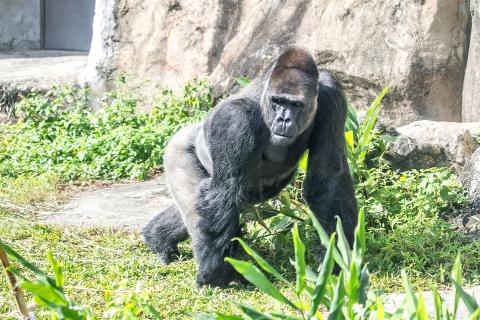After an eight-year application process, a male gorilla named Pao Pao (寶寶) at Taipei Zoo is to travel to Apenheul Primate Park in the Netherlands next month to breed.
Pao Pao was two years old when he was smuggled to Taiwan in 1987.
In the wild, young gorillas stay with their mothers until they are 11, when they form their own families, zoo spokesman Eric Tsao (曹先紹) said on Saturday.

Photo courtesy of Taipei Zoo
Because Pao Pao comes from the wild in Cameroon and gorillas are social animals, Pao Pao’s smuggling suggests that a large number of gorillas were hunted and killed, Tsao said.
As a result, there was no way that the zoo could purchase Pao Pao, he said, adding that Shin Kong Financial Holding Co chairman Eugene Wu (吳東進) donated him to the zoo.
Now approaching his 33rd birthday, Pao Pao has been approved by the European Endangered Species Program’s gorilla species committee to travel to the Netherlands to breed and increase the genetic diversity of the off-site population.
A fan of Pao Pao surnamed Yang (楊) said she lives near the zoo and for the past three years, has visited at least five times a week to speak to Pao Pao.
When she first met Pao Pao at the African animal area, he was sitting in front of the window looking sad, Yang said, adding that this inspired her to learn more about gorillas and the conditions they face.
When Pao Pao becomes a father, Yang said she will definitely visit him in the Netherlands.
Cheng Shan (鄭善), who has worked at the zoo for 27 years and is responsible for gardening, said that although she is not Pao Pao’s direct caregiver, she has developed a deep bond with him.
She always shouts his name while at work, and Pao Pao goes to her, Cheng said.
It has become a habit, Cheng said, adding that she hopes Pao Pao lives a better life in the Netherlands.
Pao Pao enjoys locally grown fruits such as guavas, papayas and oranges, Tsao said.
He especially enjoys guavas, so the zoo has designed guava-shaped farewell cards for the departing gorilla, Tsao added.

Japanese footwear brand Onitsuka Tiger today issued a public apology and said it has suspended an employee amid allegations that the staff member discriminated against a Vietnamese customer at its Taipei 101 store. Posting on the social media platform Threads yesterday, a user said that an employee at the store said that “those shoes are very expensive” when her friend, who is a migrant worker from Vietnam, asked for assistance. The employee then ignored her until she asked again, to which she replied: "We don't have a size 37." The post had amassed nearly 26,000 likes and 916 comments as of this

US President Donald Trump said "it’s up to" Chinese President Xi Jinping (習近平) what China does on Taiwan, but that he would be "very unhappy" with a change in the "status quo," the New York Times said in an interview published yesterday. Xi "considers it to be a part of China, and that’s up to him what he’s going to be doing," Trump told the newspaper on Wednesday. "But I’ve expressed to him that I would be very unhappy if he did that, and I don’t think he’ll do that," he added. "I hope he doesn’t do that." Trump made the comments in

Tourism in Kenting fell to a historic low for the second consecutive year last year, impacting hotels and other local businesses that rely on a steady stream of domestic tourists, the latest data showed. A total of 2.139 million tourists visited Kenting last year, down slightly from 2.14 million in 2024, the data showed. The number of tourists who visited the national park on the Hengchun Peninsula peaked in 2015 at 8.37 million people. That number has been below 2.2 million for two years, although there was a spike in October last year due to multiple long weekends. The occupancy rate for hotels

A cold surge advisory was today issued for 18 cities and counties across Taiwan, with temperatures of below 10°C forecast during the day and into tonight, the Central Weather Administration (CWA) said. New Taipei City, Taipei, Taoyuan and Hsinchu, Miaoli and Yilan counties are expected to experience sustained temperatures of 10°C or lower, the CWA said. Temperatures are likely to temporarily drop below 10°C in most other areas, except Taitung, Pingtung, Penghu and Lienchiang (Matsu) counties, CWA data showed. The cold weather is being caused by a strong continental cold air mass, combined with radiative cooling, a process in which heat escapes from